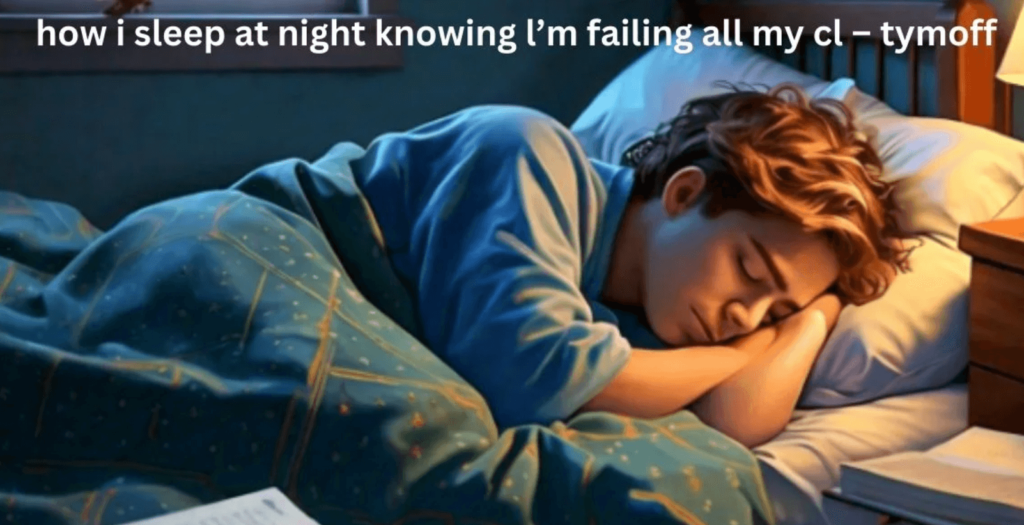
How I Sleep At Night Knowing l’m Failing All My Cl – Tymoff
Struggling academically can be a heavy burden, especially when it seems like everything is going wrong. The anxiety and stress from failing classes can take a toll on your mental health and disrupt your sleep patterns. However, getting a good night’s sleep is crucial for maintaining overall well-being and finding the strength to tackle academic challenges. This article explores various strategies and coping mechanisms to help how i sleep at night knowing l’m failing all my cl – tymoff, even when you’re facing academic difficulties.
Understanding the Anxiety of Academic Failure
Academic anxiety stems from various sources, including high expectations, fear of disappointing others, and personal ambitions. When you’re failing classes, this anxiety can become overwhelming, affecting your confidence and motivation. The psychological impact includes feelings of worthlessness, depression, and chronic stress, all of which can disrupt your sleep.
The Importance of Sleep for Mental Health
Sleep is essential for mental health, providing your brain with the rest it needs to function optimally. Lack of sleep exacerbates stress and anxiety, creating a vicious cycle where academic struggles lead to poor sleep, which in turn worsens academic performance. Understanding this connection highlights the importance of prioritizing sleep, even during challenging times.
Acceptance and Self-Compassion
One of the first steps to improving your sleep is accepting your current situation without harsh self-judgment. Recognize that failure is a natural part of the learning process. Practice self-compassion by treating yourself with kindness and understanding, rather than criticism. This shift in perspective can reduce anxiety and promote a more restful mind at night.
Creating a Sleep-Conducive Environment
Your sleeping environment plays a significant role in the quality of your sleep. Ensure your bedroom is dark, quiet, and cool. Invest in a comfortable mattress and pillows. Establish a consistent bedtime routine to signal to your body that it’s time to wind down. Small changes in your environment can make a big difference in how well you sleep.
Developing Healthy Sleep Habits
Adopting healthy sleep habits is crucial for improving sleep quality. This includes maintaining a regular sleep schedule, avoiding caffeine and heavy meals before bed, and limiting screen time in the evening. Consistency in your sleep habits helps regulate your internal clock, making it easier to fall asleep and wake up feeling refreshed.

Mindfulness and Relaxation Techniques
Mindfulness and relaxation techniques can be powerful tools for reducing pre-sleep anxiety. Practices such as deep breathing, progressive muscle relaxation, and guided imagery help calm your mind and body. Incorporate these techniques into your bedtime routine to create a sense of peace and relaxation that facilitates better sleep.
Physical Activity and Its Role in Sleep
Regular physical activity is beneficial for both your physical and mental health. Exercise helps reduce stress, anxiety, and depression, all of which can interfere with sleep. Aim for at least 30 minutes of moderate exercise most days of the week. Activities such as yoga, walking, or swimming can be particularly effective for promoting relaxation and better sleep.
Diet and Sleep Connection
What you eat and drink can significantly impact your sleep. Avoid heavy, rich, or spicy foods in the evening, as they can cause discomfort and disrupt sleep. Opt for light, sleep-friendly snacks like bananas, almonds, or a warm glass of milk. Also, be mindful of your caffeine and alcohol intake, as these can interfere with your ability to fall and stay asleep.
Managing Stress and Anxiety Before Bed
It’s crucial to address stress and anxiety before bedtime to ensure a peaceful night’s sleep. Establish calming bedtime rituals such as reading, listening to soothing music, or taking a warm bath. These activities can help shift your focus away from academic worries and prepare your mind and body for sleep.
Seeking Professional Help
If your anxiety and sleep issues persist despite your efforts, it may be time to seek professional help. Therapists and counselors can provide valuable support and coping strategies tailored to your specific needs. Cognitive-behavioral therapy (CBT) is particularly effective for treating insomnia and anxiety, helping you develop healthier thought patterns and behaviors.
Time Management and Study Techniques
Improving your time management and study techniques can alleviate some of the stress associated with academic failure. Break down your study sessions into manageable chunks, set realistic goals, and use tools like planners or apps to stay organized. Effective time management reduces the feeling of being overwhelmed and helps you stay on top of your studies.
Building a Support System
Having a strong support system is essential for coping with academic failure. Reach out to friends, family, or mentors who can offer encouragement and guidance. Sharing your struggles with others can provide relief and help you gain perspective. Remember, you don’t have to face these challenges alone.
Setting Realistic Academic Goals
Setting realistic academic goals can help you regain a sense of control and motivation. Instead of aiming for perfection, focus on achievable objectives that can lead to gradual improvement. Celebrate small victories along the way to boost your confidence and maintain a positive outlook.
Positive Affirmations and Mental Resilience
Incorporating positive affirmations into your daily routine can strengthen your mental resilience. Remind yourself of your strengths and past successes. Developing a resilient mindset helps you bounce back from setbacks and view failure as an opportunity for growth.
Balancing Academics and Personal Life
Maintaining a healthy balance between academics and personal life is crucial for overall well-being. Make time for hobbies, social activities, and relaxation. This balance reduces stress and prevents burnout, making it easier to manage academic challenges.
The Role of Hobbies and Interests
Engaging in hobbies and interests outside of academics can provide a much-needed break from stress. Whether it’s painting, playing a musical instrument, or gardening, these activities offer joy and relaxation, contributing to better mental health and sleep.
Understanding Your Learning Style
Everyone has a unique learning style, and understanding yours can enhance your academic performance. Identify whether you are a visual, auditory, or kinesthetic learner, and adapt your study methods accordingly. This personalized approach can make studying more effective and less stressful.
Read more: Imlovelylo Real Name: Mystery Behind the Popular Influencer
Technology and Sleep
Excessive use of technology, especially before bed, can disrupt your sleep. The blue light emitted by screens interferes with the production of melatonin, the sleep hormone. Limit screen time in the evening and consider using apps or settings that reduce blue light exposure.
The Power of Gratitude
Practicing gratitude can improve your mental well-being and sleep quality. Keep a gratitude journal and write down things you are thankful for each day. Focusing on positive aspects of your life can shift your mindset and reduce anxiety, leading to better sleep.
Dealing with Academic Pressure
Academic pressure from peers, family, or even yourself can be overwhelming. Learn to set boundaries and manage expectations. Focus on your personal progress rather than comparing yourself to others. Finding internal motivation and acknowledging your efforts can reduce pressure and improve your mental state.
Real-Life Stories and Testimonials
Hearing from others who have faced similar challenges can be inspiring and reassuring. Real-life stories and testimonials provide insight into how others have overcome academic failure and managed to succeed. These narratives can offer practical advice and a sense of hope.
Conclusion
Facing academic failure is undoubtedly challenging, but it doesn’t have to rob you of a good night’s sleep. By implementing the strategies discussed, such as developing healthy sleep habits, managing stress, and seeking support, you can improve your sleep quality and overall well-being. Remember, failure is not the end but a stepping stone to future success. Embrace the journey, practice self-compassion, and take it one step at a time.
Read more: Violet Gems: A Comprehensive Guide
FAQs
How can I manage anxiety caused by failing classes?
- Recognize that failure is part of the learning process, practice self-compassion, and seek professional help if needed.
What are some effective relaxation techniques before bed?
- Deep breathing, progressive muscle relaxation, and guided imagery can help calm your mind and body.
How does exercise affect sleep quality?
- Regular physical activity reduces stress and anxiety, promoting better sleep.
What foods should I avoid before bed?
- Avoid heavy, rich, or spicy foods, as well as caffeine and alcohol.
How can I improve my time management for studying?
- Break study sessions into manageable chunks, set realistic goals, and use planners or apps to stay organized.
When should I seek professional help for anxiety and sleep issues?
- If anxiety and sleep problems persist despite self-help efforts, consider seeking therapy or counseling.


